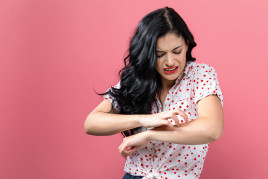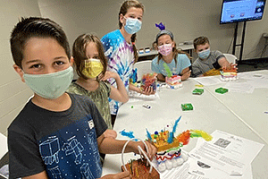Infant sun protection: How parents can keep their baby safe
Infant sun protection: How to keep your baby safe
Skin cancer is the most common cancer in the United States, and it only takes one blistering sunburn during childhood or adolescence to nearly double a person’s chance of developing melanoma – the most serious form of skin cancer – later in life.
To protect your baby from the sun, follow these tips from board-certified dermatologists.
Skin cancer is the most common cancer in the United States, and it only takes one blistering sunburn during childhood or adolescence to nearly double a person’s chance of developing melanoma, the most serious form of skin cancer, later in life. This is why it’s important for parents to do everything they can to protect their infants from the sun’s harmful UV rays and teach their children healthy sun care habits – starting at an early age.
To keep your child safe outdoors, dermatologists recommend the following tips:
Keep your baby in the shade. Shade is the best way to shield your baby from the sun, especially if he or she is younger than six months old. Keep your baby in the shade as much as possible, and if you can’t find shade, create your own using an umbrella, canopy or the hood of a stroller.
Dress your baby in sun-protective clothing, such as a lightweight, long-sleeved shirt and pants. In addition, make sure your baby always wears a wide-brimmed hat and sunglasses with UV protection.
Minimize sunscreen use on children younger than six months old. However, if shade and adequate clothing are not available, parents and caretakers may apply a minimal amount of broad-spectrum, water-resistant sunscreen with an SPF of at least 30 to their children’s skin. Sunscreens containing titanium dioxide or zinc oxide are less likely to irritate a baby’s sensitive skin. Remember to reapply your child’s sunscreen every two hours or immediately after swimming or sweating, as there is no such thing as “waterproof” sunscreen.
Stay safe on hot days. In addition to sun protection, stay safe on hot days by making sure your baby does not get overheated and drinks plenty of fluids. If your baby is fussy, crying excessively or has redness on any exposed skin, take him or her indoors immediately.
Sun protection is important at every stage of life, including infancy. Always protect yourself and your family from the sun, and see a board-certified dermatologist if you have any questions about how to take care of your baby’s skin.
 Atopic dermatitis: More FDA-approved treatments
Atopic dermatitis: More FDA-approved treatments
 Biosimilars: 14 FAQs
Biosimilars: 14 FAQs
 How to trim your nails
How to trim your nails
 Relieve uncontrollably itchy skin
Relieve uncontrollably itchy skin
 Fade dark spots
Fade dark spots
 Untreatable razor bumps or acne?
Untreatable razor bumps or acne?
 Tattoo removal
Tattoo removal
 Scar treatment
Scar treatment
 Free materials to help raise skin cancer awareness
Free materials to help raise skin cancer awareness
 Dermatologist-approved lesson plans, activities you can use
Dermatologist-approved lesson plans, activities you can use
 Find a Dermatologist
Find a Dermatologist
 What is a dermatologist?
What is a dermatologist?